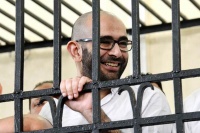Brutally arrested as part of a wave of arrest in Alexandria on 8 July 2013, a few days after General Sisi's military coup, following clashes between pro-Morsi and pro-coup demonstrators, Hassan and 57 other people had been charged with "murder" and "attempted murder" of children in addition to other charges related to the demonstrations. The media coverage of their arrests quickly became biased, undermining the principle of presumption of innocence of the accused and making it harder to prepare his defence.
Following his arrest, Mahmoud had been detained incommunicado for nearly one month in the Alexandria Security Directorate, where he reported having been tortured to confess the crimes he was accused of. Physically weakened and psychologically affected by this ordeal, he eventually confessed – under duress and before a camera – to the murder of a young boy during the clashes, without having been able to consult with his lawyer beforehand.
The latter requested the withdrawal of his confessions before the court but, instead of meeting his request, the judge admitted them as evidence. The reason why he was the only man (of the 57 prosecuted with him) given the death penalty – without any plausible justification or proof of his involvement in the death of the boy except the forced confessions – is unclear. Still, his sentence was approved by Grand Mufti of Egypt and his appeal rejected by the Court of Cassation. Ultimately, his family's demand for a presidential grace was refused and he was executed on 7 March 2015.
Mahmoud's execution is the first one to be carried out since the July 2013 coup, illustrating the stance taken by the new government against political opponents and the authorities' will to crush dissent by all means. His execution could set a precedent and lead to the execution of hundreds of other demonstrators who have been sentenced to death in the past year after expeditious mass trials.
"We deeply regret the decision of the Egyptian authorities and of the new Interior Ministry to have carried out Hassan's execution despite the numerous flaws in his trial that had been highlighted and brought to the attention of the Prosecution and the judges," said Rachid Mesli, Legal Director at Alkarama. "The use of the death penalty as a tool to repress political opposition in Egypt is the sign of a regime that has no limits and the decision to carry the sentence is an alarming signal to the international community regarding its current state of affairs," he added.
Alkarama recalls that the death penalty must not and should not be carried out under any circumstances and that Egypt's political unrest will not stop through this mean. In this sense, Alkarama calls upon the Egyptian authorities to repeal all death sentences taken against demonstrators as recommended by several countries during Egypt's last Universal Periodic Review in October 2014.
For more information or an interview, please contact the media team at This email address is being protected from spambots. You need JavaScript enabled to view it. (Dir: +41 22 734 1007 Ext: 810)
 Algeria
Algeria Bahrain
Bahrain Djibouti
Djibouti Egypt
Egypt Iraq
Iraq Palestine/Israel
Palestine/Israel Jordan
Jordan Kuwait
Kuwait Lebanon
Lebanon Libya
Libya Mauritania
Mauritania Morocco
Morocco Oman
Oman Qatar
Qatar Saudi Arabia
Saudi Arabia Sudan
Sudan Syria
Syria Tunisia
Tunisia United Arab Emirates
United Arab Emirates Yemen
Yemen Other Countries
Other Countries







